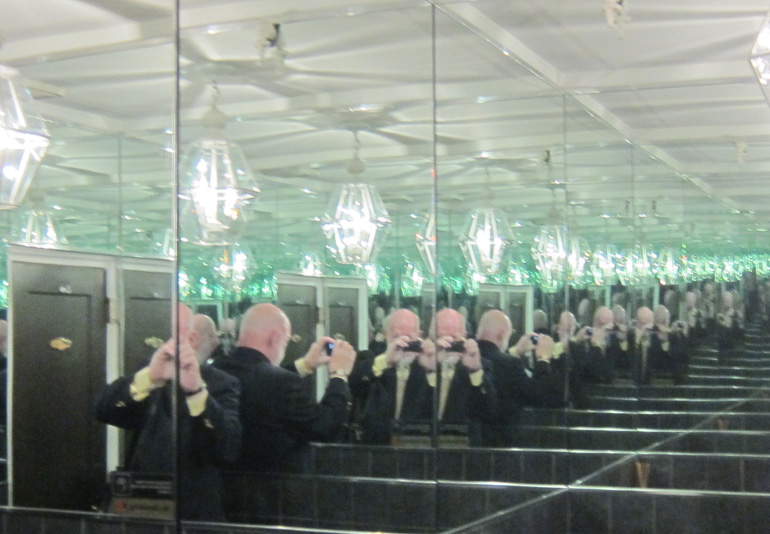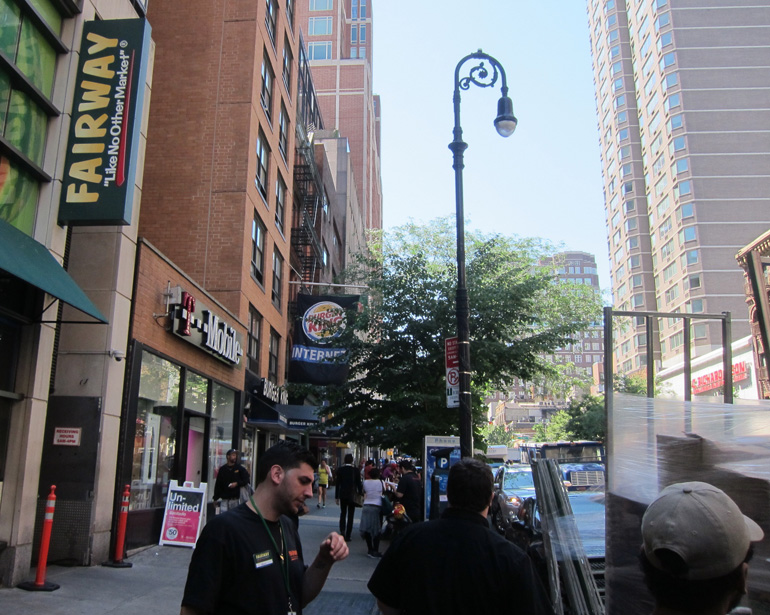Gotham Diary:
Lighting
28 June 2013
Friday, June 28th, 2013
The end of June is always melancholy, as is the end of every green month from April to July. (August has a strange way of spilling over into September instead of coming to an end.) I remind myself that we will probably be enjoying the balcony throughout October. I hope that we get to enjoy it tonight — we’re having another picnic, and the weather is uncertain. (It’s unlikely to be too cold.) I’m a bit jumbled, having been called by a truck driver shortly after nine this morning. He wanted to deliver a piece of furniture but they weren’t letting him use the service entrance. Of course they weren’t. We had had no notice of this delivery, we had not filed the appropriate insurance letter with the management office, and the guard was not going to let me carry in the chair myself, no matter how much I bribed him, because of the surveillance cameras. It’s obvious to anyone with a brain that no one is looking at the surveillance tapes until after there has been some sort of problem — highly unlikely in the case of my carrying in a chair. By the time we’d come up with a workaround, the driver had taken off. Understandably: the service entrance is partially obstructed by the subway-station construction site.
We’re told that the blasting will cease this fall, and that the construction site will be cleared away next fall. (The subway itself won’t be running until 2017.) Meanwhile, the three sides of the building that face the street are still heavily scaffolded, at sidewalk level, in connection with the balcony railing replacement project. Which, if you ask me, is somewhere one side or the other of halfway done. Living in a construction site is never fun, but this has gone on for so long that one’s imagination of deliverance has been flattened, and the year to come stretches out into infinity.
***
The other night, I did watch Psycho, and I was, to my surprise, wowed. I was right to fear the dreariness of the television aesthetic that Alfred Hitchcock employed in order to make the movie on the cheap (he produced it out of his own pocket), but this disadvantage only intensified the excellence of the performances, especially in ensemble. There are two really riveting scenes in Psycho, and they are not the ones you’re thinking of; no one gets killed in either. Anthony Perkins is featured in both of them, but in his proper young-man clothes. In the first, he talks to Janet Leigh, and in the second, to Martin Balsam. The scenes are very different, because, of course, Norman Bates has done something very wicked in between them. With Marion Crane (Ms Leigh), Norman is a bright if strange young man who wants to make a good impression but cannot help himself when Marion inadvertently trips his wiring. With Detective Arbogast (Mr Balsam), Norman is an anxious dissembler whose discomfort makes Arbogast smell guilt. Martin Balsam adopts a breezily insincere persistence, as if he’s interrogating Norman in a nice-guy way. (There is something about the light that falls on Balsam’s full lower lip that highlights the menace that makes Norman so jittery.) But the scene is all the more uncomfortable because we know that Arbogast, for all his calm cockiness, his worldly assurance that he knows what Marion Crane is up to, has no idea that he is dealing with a dangerous, psychotic murderer.
The first great scene, in Norman’s office parlor, plays out a far more subtle drama. For one thing, it is the first moment of calm in the movie. Marion’s life, until now, has alternated between frustration and despair, culminating in a drive through dark, heavy rain. The conversation that she has with Norman, as she eats the sandwich that he has brought her (nice boy that he is), convinces her to abort her criminal flight and return to Phoenix. The other subtlety is Anthony Perkins’s posture. When Norman sits back in his easy chair, his affect is normal, but when he sits forward, and the camera picks out his glittering eyes, he is possessed by his disease, which springs from his inability to accept the fact that he killed his mother. Marion, distracted by the weight of her own problems, does not back away when Norman responds with inappropriate hostility to her sympathetic suggestions. She is calm, too. She, like Arbogast, makes the fatal mistake of seeing Norman as a harmless weakling.
The tremendous power that reverberates from these scenes, together with that of the visceral brutality of the murders that follow each, floats the movie well above the TV-grade production values that work themselves even into the script at the film approaches the end. Psycho is a departure for Hitchcock in that he ordinarily made pictures that are more powerful the second time, when you know what’s going to happen. The fatality of his pictures is rich and deep, and can’t be appreciated in a first viewing. Psycho, in contrast, is a shocker, a film famous for riveting audiences with completely unexpected violence. Such moments are self-extinguishing. A second viewing will bring out the ironies — ironies that are embedded primarily in the two scenes that I’ve discussed — but it pushes the murders into grand guignol that was never Hitchcock’s stock-in-trade, even though these celebrated scenes suggest a great deal more violence than they actually show.
Repeated viewings also deepen the impression that Anthony Perkins makes, not so much as a crazy person but as an extraordinarily interesting subject for Hitchcock’s expressionist photography. By the time he’s finally apprehended, we’re so relieved that he’s no longer at large that the somewhat bogus psychoanalytic evaluation, delivered in the earnest, “doctors call it iron-deficiency anemia” television style of the day by Simon Oakland, comes as a welcome debriefing, instead of the insufferable padding that it would be otherwise.
***
Watching Marion recoils apologetically from Norman’s overreaction to her suggestion that he put his mother in care, I felt an enormous sympathy with her, because I have triggered such unexpected hostility all my life. Maybe we all do, and I’ve just noticed it more; or, maybe I’m more like Norman Bates than I think, and am seriously out of touch with common human nature. I have at any rate become extremely circumspect about giving advice. I’d rather seem callous.




















